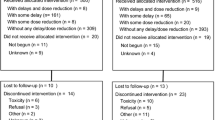Abstract
A phase III randomised study, comparing treatment with fluorouracil, epidoxorubicin and methotrexate (FEMTX) with the best supportive care, was conducted in patients with unresectable or metastatic gastric cancer. During the period from July 1986 to June 1992, 41 patients were randomised to receive FEMTX or best supportive care. MTX was given in a dose of 1500 mg m-2 intravenously (i.v.) followed after 1 h by 5-FU 1500 mg m-2 i.v. on day 1; leucovorin rescue was started after 24 h (30 mg orally every 6 h for 48 h) and epidoxorubicin 60 mg m-2 i.v. was administered on day 15. In addition both groups received tablets containing vitamins A and E. Response rates for FEMTX were as follows: complete response (CR), 19% (4/21); partial response (PR), 10% (2/21); no change (NC), 33% (7/21); and progressive disease (PD), 24% (5/21). Response rates in the control group were: NC, 20% (4/20); and PD, 80% (16/20). Increased pain was observed in one patient in the treated group and in 11 patients in the control group within the first 2 months. WHO grade III/IV toxicity in the chemotherapy group was as follows: nausea/vomiting 40%, diarrhoea 10%, stomatitis 15%, leucopenia 50% and thrombocytopenia 10%. One possible treatment-related death was due to sepsis. The median time to progression in the FEMTX group was 5.4 months [95% confidence interval (CI) 3.1-11.7 months], but only 1.7 months in the control group (95% CI 1.2-2.7 months) (P = 0.0013). Similarly, the FEMTX group displayed significantly (P = 0.0006) prolonged survival compared with the control group, i.e. median survival 12.3 months (95% CI 7.1-15.6 months) vs 3.1 months (95% CI 1.6-4.6 months). In conclusion, FEMTX combined with vitamin A and E is a fairly well-tolerated treatment, giving a response rate of 29% in patients with advanced gastric cancer, and also prolonging patients' survival. It can be used as a reference treatment in testing new investigational combinations.
Similar content being viewed by others
Author information
Authors and Affiliations
Rights and permissions
About this article
Cite this article
Pyrhönen, S., Kuitunen, T., Nyandoto, P. et al. Randomised comparison of fluorouracil, epidoxorubicin and methotrexate (FEMTX) plus supportive care with supportive care alone in patients with non-resectable gastric cancer. Br J Cancer 71, 587–591 (1995). https://doi.org/10.1038/bjc.1995.114
Issue Date:
DOI: https://doi.org/10.1038/bjc.1995.114
- Springer Nature Limited
This article is cited by
-
Development of nomograms for predicting the survival of intestinal-type gastric adenocarcinoma patients after surgery
Scientific Reports (2023)
-
Randomised comparison of fluorouracil, epidoxorubicin and methotrexate (FEMTX) plus supportive care with supportive care alone in patients with non-resectable gastric cancer: S Pyrhönen, T Kuitunen, P Nyandoto & M Kouri
British Journal of Cancer (2023)
-
Japanese Gastric Cancer Treatment Guidelines 2021 (6th edition)
Gastric Cancer (2023)
-
Prophylactic surgery plus hyperthermic intraperitoneal chemotherapy (HIPEC CO2) versus standard surgery for gastric carcinoma at high risk of peritoneal carcinomatosis: short and long-term outcomes (GOETH STUDY)—a collaborative randomized controlled trial by ACOI, FONDAZIONE AIOM, SIC, SICE, and SICO
Trials (2022)
-
Risk factors and characteristics of bacterial infection during first-line chemotherapy for metastatic gastric or gastroesophageal junction adenocarcinoma
Supportive Care in Cancer (2022)




